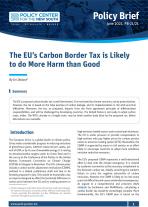The EU’s Carbon Border Tax is Likely to do More Harm than Good
The EU's proposed carbon border tax is well intentioned. It is motivated by climate concerns, not by protectionism. However, the tax is based on the false premise of carbon leakage, and its implementation is rife with practical difficulties. Moreover, the tax, as proposed, departs from the Paris agreement principle of differentiated responsibilities, and will be challenged by developing countries. The United States is not ready to adopt carbon taxes, either. The WTO, already in a fragile state, may be dealt another body blow by the proposed tax. Better alternatives are available.
The European Union is a global leader in climate policy. It has made considerable progress in reducing emissions of greenhouse gases, whether measured per capita, per unit of GDP, or by its use of renewable energy. It is raising its decarbonization targets under its Green Deal and in the run up to the Conference of the Parties to the United Nations Framework Convention on Climate Change (COP26) in Glasgow in November. The EU’s climate plans include a carbon border adjustment mechanism (CBAM), outlined in a leaked preliminary draft and due to be formally proposed in July. This would be essentially a tax on imports designed to offset the (notional) difference in carbon price between the EU and its trading partners high emission traded sectors such as steel and aluminum. The EU is under pressure to provide compensation to high emitters who pay higher prices for carbon permits under its emission trading system (ETS). Meanwhile, the CBAM is supported by many in civil society as an effort likely to encourage countries to adopt more ambitious emission reduction measures.










